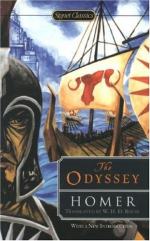Now Leiodes took hold of the knees of Odysseus eagerly, and besought him and spake winged words: ’I entreat thee by thy knees, Odysseus, and do thou show mercy on me and have pity. For never yet, I say, have I wronged a maiden in thy halls by froward word or deed, nay I bade the other wooers refrain, whoso of them wrought thus. But they hearkened not unto me to keep their hands from evil. Wherefore they have met a shameful death through their own infatuate deeds. Yet I, the soothsayer among them, that have wrought no evil, shall fall even as they, for no grace abides for good deeds done.’
Then Odysseus of many counsels looked askance at him, and said: ’If indeed thou dost avow thee to be the soothsayer of these men, thou art like to have often prayed in the halls that the issue of a glad return might be far from me, and that my dear wife should follow thee and bear thee children; wherefore thou shalt not escape the bitterness of death.’
Therewith he caught up a sword in his strong hand, that lay where Agelaus had let it fall to the ground when he was slain, and drave it clean through his neck, and as he yet spake his head fell even to the dust.
But the son of Terpes, the minstrel, still sought how he might shun black fate, Phemius, who sang among the wooers of necessity. He stood with the loud lyre in his hand hard by the postern gate, and his heart was divided within him, whether he should slip forth from the hall and sit down by the well-wrought altar of great Zeus of the household court, whereon Laertes and Odysseus had burnt many pieces of the thighs of oxen, or should spring forward and beseech Odysseus by his knees. And as he thought thereupon this seemed to him the better way, to embrace the knees of Odysseus, son of Laertes. So he laid the hollow lyre on the ground between the mixing-bowl and the high seat inlaid with silver, and himself sprang forward and seized Odysseus by the knees, and besought him and spake winged words:
’I entreat thee by thy knees, Odysseus, and do thou show mercy on me and have pity. It will be a sorrow to thyself in the aftertime if thou slayest me who am a minstrel, and sing before gods and men. Yea none has taught me but myself, and the god has put into my heart all manner of lays, and methinks I sing to thee as to a god, wherefore be not eager to cut off my head. And Telemachus will testify of this, thine own dear son, that not by mine own will or desire did I resort to thy house to sing to the wooers at their feasts; but being so many and stronger than I they led me by constraint.’




